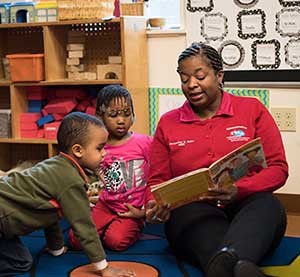Tiny Tots: The business of non-profit childcare
Tiny Tots stood at the edge of a cliff.
But the trusted south Seattle institution was so focused on its mission of providing quality childcare and early education to low-income families that it hardly even noticed the danger.
Tuition subsidies for its clients—400 families, nearly all living below the federal poverty line—barely covered the cost of operations at its six locations. A sudden spike in the minimum wage for childcare workers further tightened the financial screws. And, as several other long-time providers in the community recently closed their doors, demand for Tiny Tots’ affordable services was ever growing in a neighborhood largely left behind in Seattle’s current economic boom.
A community lifeline for nearly five decades, Tiny Tots needed to consider what it would take to survive the next year, let alone the next 50.
“Whatever came up, we always figured it out,” says Jacqualine Boles, director of family and health services at Tiny Tots. “But then the reality hit us: what we’re doing has to be sustained or we won’t make it.”
The Tiny Tots staff excelled at care and education (and ad hoc problem solving). But what they needed was a long-term strategic plan. For this, they needed help.

Jacqualine Boles, director of family and health services at Tiny Tots, reading to kids
Help arrives
A bit of good fortune led Tiny Tots to the Consulting and Business Development Center at the University of Washington Foster School of Business.
The Center connected Boles and executive director Angelia Maxie with its core Student Consulting program. The program deploys small teams of Foster students—guided by mentors from the Seattle Rotary Club and professional advisors from local consulting firms—to help small businesses in under-served communities address a wide range of business challenges and opportunities.
For Tiny Tots, the challenge was finding firmer financial footing to sustain their essential presence in the community.
Last winter, a team of Foster undergraduates performed a comprehensive review of the organization, from mission statement to policies to financials to marketing. They produced a strategic plan that streamlined operations, clarified financial accounting, and recommended more robust marketing of their deep well of life-changing stories.
They convinced the non-profit to act like a business.
“We were a mom-and-pop shop for many years,” Boles says. “The students helped us see that we are not just taking care of kids. We have a real business. And we have got to compete, market ourselves, be aggressive.”
Culture of asking
But the students’ business analysis also identified a missed opportunity to act like a non-profit: fundraising.
“They made us realize that we didn’t have a culture of asking,” Boles says. “We never asked people for anything. It really has changed our whole way of thinking.”
Since the project closed, Tiny Tots has been regularly reaching out within and beyond its community. Asking for help.
And people are responding. Parents contribute whatever and however they can to their children’s classrooms. The board is growing more active, sparked by new recruits from the larger business community. Microsoft employees, served a soul-food lunch while beautifying Tiny Tots facilities during last year’s United Way Day of Caring, forked over $1,600 on the spot—with a company match—when Boles asked for contributions. And employees and friends are participating in the “Find 100 ways to love Tiny Tots” campaign of viral fundraising.
The biggest ask of all was the organization’s first-ever fundraising breakfast in December, keynoted by the owner of the Seattle Reign (who was there because Maxie asked).
It’s early to measure the impact of the Foster students working through the Consulting and Business Development Center. But Boles and Maxie are optimistic and energized.
“We’ve seen a big shift in our culture,” Boles says. “Our founder just wanted to take care of some kids, and she did that well. But now we are figuring out all of the pieces so that we will be here in 100 years.
“It was hurtful to see some of the long-time childcare providers in the community close after so many years. They just couldn’t survive any more. They didn’t get a Foster School team. I’m so grateful that they came and are helping us figure it out.”
